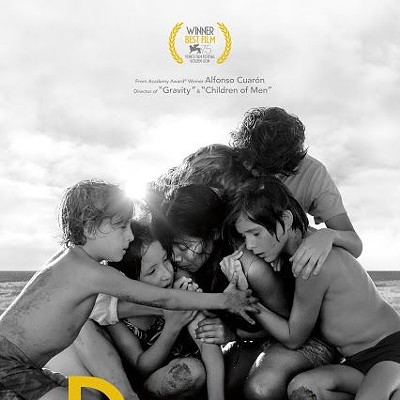21
Loosely adapted from Ben Mezrich’s fact-based bestseller Bringing Down the House, 21 is an entertaining and fast-paced film that occasionally manages to make the act of counting cards seem as exciting as this past winter’s Super Bowl -- and as perilous as climbing Mount Everest with both eyes closed. Jim Sturgess, fresh off his starring role as Jude in Across the Universe (as well as a supporting turn in The Other Boleyn Girl), plays Ben Campbell, a brilliant MIT student who needs some serious dough in order to be able to afford a stint at Harvard. His intelligence catches the eye of Micky Rosa (Kevin Spacey), a shrewd professor whose extracurricular activity is training a hand-picked group of students in the art of counting cards at the blackjack table. He welcomes Ben to a gang that already includes two guys (Aaron Yoo and Jacob Pitts) and two girls (Kate Bosworth and Liza Lapira), and together they set off on weekly excursions to Las Vegas to clean up. Yet although they believe they’re operating under the wire, their winning ways -- not to mention squabbles from within -- catch the eye of Cole Williams (Laurence Fishburne), an old-school casino enforcer whose preferred MO is taking cheaters to a back room and beating them to a bloody pulp. The movie works best during its first act, when the fascinating con game is explained to Ben (and to us), and during its second act, when Ben feels his life spiraling out of control as he makes a series of mistakes that could cost him everything. Scripters Peter Steinfeld and Allan Loeb only really lose control during the third act, when an important plot point too lumpy to swallow leads to a series of increasingly unbelievable developments. Yet even during this convoluted section, director Robert Luketic and a perfectly cast Spacey insure that this stylish film maintains a winning hand.
Drillbit Taylor
As the trio of dweebs who find themselves the perpetual targets of high school bullies, lanky Nate Hartley, rotund Troy Gentile and spastic David Dorfman turn in natural, likable performances that go a long way toward making this dopey comedy even remotely watchable. Even so, the three are basically carbon copies of Superbad's lanky Michael Cera, rotund Jonah Hill and spastic Christopher Mintz-Plasse -- hardly a surprise, given that both films were produced by Judd Apatow and co-written by Seth Rogen. Both movies largely deal with three nerds trying to appear cool to their fellow students; the added attraction here is the character of Drillbit Taylor (Owen Wilson), a homeless man who passes himself off as a bodyguard in order to earn some money protecting the undersized freshmen from the vicious seniors (Alex Frost and Josh Peck) who terrorize them at every turn. An assembly-line comedy in virtually every facet -- you can set your watch by the moment when the formerly aloof Drillbit is visibly moved by a charitable act on the part of one of the kids -- this dispiriting attempt at corralling laughs has little to offer anyone except die-hard Owen Wilson fans, and even those devotees might feel dejected after watching this charming if one-note actor spinning his wheels in such a tiresome character type.
Run, Fat Boy, Run
Run, Fat Boy, Run stars one of the two male leads (Simon Pegg) from Shaun of the Dead and Hot Fuzz, and, no, it isn't the fat one. Instead, it's the average-sized one, immediately nullifying this movie's title. Now if only someone had nullified this picture's very existence, we'd have one less bomb taking up valuable multiplex space. Instead, we're stuck with a wretched comedy whose greatest claim to, uh, fame is that it marks the directorial debut of Friends co-star David Schwimmer. But with friends like Schwimmer, who needs enemies? Along with writers Michael Ian Black and Pegg, Schwimmer has served up a broad, crass and spectacularly unfunny piece about a sad sack who abandoned his pregnant fiancee at the altar on their wedding day. Five years later, Dennis (Pegg) continues to regret the cowardice he displayed on that day, but the only reason Libby (Thandie Newton) hasn't shut him out of her life completely is because she believes their child Jake (Matthew Fenton) should have a relationship with his father. Dennis hopes to somehow win back Libby, but time is running o
ut since she's becoming more heavily involved with a successful businessman named Whit (Hank Azaria). The lazy and physically unfit Dennis is no match for the industrious and health-conscious Whit, but that doesn't prevent him from entering a 28-mile marathon in an effort to gain back Libby's love and respect. It's a thin premise undermined by rampant stupidity at every turn, from the lazy decision to turn Whit into a paper villain (so audiences won't have to strain their brains deciding who's better for Libby) to the infantile brand of comedy that appears at alarming intervals right up to the very end (literally; the final shot in the movie is a close-up of a flabby bare bottom).
Dr. Seuss' Horton Hears a Who!
In Horton's world, "a person's a person, no matter how small," but in our world, a mediocre movie's a mediocre movie, no matter how overhyped, overblown and overbearing. Certainly, there are some who will give this animated film a free ride by virtue of the fact that it's roughly 10,000 times better than the ghastly live-action version of Dr. Seuss' The Cat In the Hat. That's absolutely true, but it's also true that a month-old loaf of bread isn't nearly as disgusting as a year-old loaf of bread, and I wouldn't care to indulge in either. There's a reason that the 1966 TV version of How the Grinch Stole Christmas! remains the best Seuss on film, and that's because its 26-minute length comes closest to approximating the brief reading time of one of the good doctor's delightful books. But when stretched out to 90 minutes, a great deal of padding is needed, thereby maximizing the chances of screwing up the source material. That's definitely the case here, since the basic story -- Horton the happy-go-lucky elephant finds himself ridiculed by the other jungle denizens when he insists that a speck on a flower contains an entire civilization (the residents of Whoville) -- retains its humanist (better make that anthropomorphic) appeal. But the additions to the original content are misguided, beginning with a decidedly non-Seussian reference to "poop" and ending with an atrocious Pokemon-inspired sequence that must be seen to be disbelieved. While the animation captures the intricate details found on the storybook pages, the sense of whimsy is missing, replaced by a heavy-handed touch all the more noticeable by the marquee-value-only casting of Jim Carrey (as Horton), Steve Carell, Seth Rogen and others.
The Bank Job
The Bank Job bills itself as being based on a true story, but given cinema's propensity for fudging details every which way, that's not a declaration that I'd be willing to take to the bank myself. But veracity be damned: Even if every detail of this heist flick was drenched in fiction, it doesn't change the fact that it's one compelling package. The film is set in 1971, which seems right, since one could easily picture the British heavyhitters of that era (Michael Caine, Ian Bannen, Harry Andrews, etc.) appearing in a film just like this one (Caine, in fact, did headline a heist flick during this period, 1969's The Italian Job). And inhabiting the film's central role is Jason Statham, who thanks to a series of action films has become the current poster boy for British roughhousing. The Bank Job gives his character, Terry Leather, a chance to use his brains more than his brawn, and this allows Statham a bit more vulnerability than usual -- his character even has a wife and two daughters, a break from the image of the emotionless lone warrior. Terry is approached by a former acquaintance (Saffron Burrows) to pull off a robbery at a Lloyds Bank that will benefit them both. She has her own reasons beyond monetary gain for making this proposal, and Terry senses that rather quickly. But he and his crew go for it anyway, a decision that involves them in a labyrinthine scandal that not only reaches into the upper echelons of government but also snares the British royal family as well.
Brimming with satisfying twists and populated with colorful characters, this represents a Job well done.
Miss Pettigrew Lives for a Day
This is the sort of airy confection that will be dismissed by many as a pleasant but forgettable bauble, and that's OK. But catch it on the proper wavelength, and its pleasures are not only bountiful but durable. It's romantic without being cynical, witty without being puerile, and blessed by two divine performances from Frances McDormand and Amy Adams. McDormand plays the title character, a British maid in 1939 London who all too suddenly finds herself unemployed. Desperate to remain off the streets, she dupes her way into the position of social secretary to American actress Delysia Lafosse (Adams), a dim but sweet-natured starlet whose biggest problem seems to be choosing between two playboys (Tom Payne and Mark Strong) who can advance her career and a struggling pianist (Lee Pace) who truly loves her. Yeah, I know: It's a no-brainer ascertaining who gets her hand by the fadeout. Yet despite Adams' screwball-style performance -- as enchanting as her turn in Enchanted -- the film's main source of delight doesn't rest with Delysia's affairs of the heart but with Miss Pettigrew's. A prim woman who lost her beloved during the First World War, Miss Pettigrew has long given up on any chance at romance. That a potential suitor comes along in the form of a successful clothing designer (Ciaran Hinds) seems just right, not only by the demands of the storyline but by the demands of our own hearts. McDormand sells her character with utter conviction, and the only thing possibly more praiseworthy than Miss Pettigrew is the movie that bears her name.
10,000 B.C.
Playing like a cross between Mel Gibson's Apocalypto and the fanboy fave 300, this empty-headed spectacle from Stargate director Roland Emmerich centers on a young man who, when it comes to heroes leading their people out of the darkness, emerges as a towering figure worthy of standing alongside Moses, William "Braveheart" Wallace and Michael Moore. Steven Strait plays this warrior, whose name is D'Leh (not to be confused with Homer Simpson's "D'Oh!") and whose bland, pretty-boy countenance makes him a precursor to Malibu Ken. If surfboards had been around in 10,000 B.C., you can bet D'Leh would have been out searching for the perfect wave rather than hanging around a dusty village brooding over daddy issues (Pop disappeared when D'Leh was a wee lad, and the rumor goes that the man abandoned the tribe in its moment of need). When he's not busy being tutored by his adoptive father Tic'Tic (Cliff Curtis), D'Leh passes the time by flirting with his one true love, Evolet (blank slate Camilla Belle). Evolet has these piercing blue eyes, but even more noticeable throughout the film is the makeup which surrounds them, and which never gets smeared even after she's been shedding copious tears. Who knew Maybelline existed as far back as 10,000 B.C.? At any rate, Evolet and her mascara kit are snatched, along with dozens of other villagers, by raiders who need more slaves to help them build temples and monuments in their sprawling kingdom many miles away. The film's geographic location is never specified, yet although the marauders appear Egyptian, a monument under construction looks just like the lion statues guarding the entrance of the New York Public Library, thereby conclusively establishing the movie's setting as Midtown Manhattan.
The Other Boleyn Girl
An often fascinating blend of fact, rumor and outright fabrication, The Other Boleyn Girl feels like an Oscar-bait title that somehow got its DNA mixed up with a daytime soap opera. Based on Philippa Gregory's controversial novel, this tracks the political intrigue and bedroom shenanigans which sprang from the attempts of the Boleyn family to get in the good graces of King Henry VIII (Eric Bana). Prodded on by the most venal member of the clan, the scheming Duke of Norfolk (The Reaping's David Morrissey, as uninteresting as always), the quivering Sir Thomas Boleyn (Mark Rylance) agrees to offer his strong-willed daughter Anne (Natalie Portman) to the king as replacement for his majesty's current wife Catherine (Ana Torent), who has been unable to produce a male heir. But after Anne quickly falls out of Henry's favor, the men serve up Anne's demure sister Mary (Scarlett Johansson) instead; a torrid love affair takes place, but when that begins to cool thanks to Henry's growing disinterest, Anne is brought back onto the scene. If Charles Laughton (winning an Oscar for 1933's The Private Life of Henry VIII) was the chunkiest Henry VIII ever put on film, then Bana might be the hunkiest, but it's hardly a desirable tradeoff, given the actor's drowsy performance. His female co-stars fare better, though it's hard to accept the physically dissimilar Portman and Johansson as flesh-and-blood siblings.
Penelope
An ugly duckling of a movie, Penelope is a sweet but clumsy fable that's pleasing without being distinguished. Christina Ricci has always sported a nose that tilts upward, so it's perhaps either lazy casting or a sly in-joke that she was the one chosen to essay the title role, a poor little rich girl suffering from an ancient family curse that saddled her at birth with a pig's snout. Now 25, Penelope has been a prisoner in her own home by her busybody mother (Catherine O'Hara), who only allows blueblood bachelors to visit her daughter in the hopes that one of them will ask for her hand in marriage. A reporter (Peter Dinklage) who's forever been trying to get a photo of Penelope hears of this arrangement, and he hires a down-and-out playboy (Atonement's James McAvoy) to gain entry and take the snapshot; needless to say, real feelings develop, hearts get broken, and, as in Babe: Pig In the City, our protagonist finds herself adrift in the city.
Semi-Pro
Will Ferrell as an idiotic guy prone to infantile outbursts -- check. Ferrell making loud noises and running around like a goofball in a desperate attempt to generates laughs -- check. Ferrell sporting a laughable hairstyle (this one vintage 1970s) -- check. Ferrell surrounding himself with his comedian friends, some with extremely limited talent -- check. Ferrell resorting to ca-ca and pee-pee level jokes with alarming regularity -- check. Ferrell making more loud noises -- check. And so it goes, reaching a point of such creative bankruptcy that Ferrell stands poised to become as tiresome a screen jester as Robin Williams.
Jumper
Jumper is Highlander for a new generation: a cheesy, globetrotting film certain to be savaged by most critics, but also a mindlessly entertaining yarn likely to lead to a string of sequels and/or TV adaptations. Hayden Christensen, still struggling with that wooden aspect of his acting, plays David Rice, a kid who discovers he has the ability to "jump" to any location on the planet in a matter of seconds.
The Spiderwick Chronicles
Smoothly directed by Mark Waters, the miracle worker responsible for Lindsay Lohan's two best performances (Freaky Friday and Mean Girls), Spiderwick displays a lighter touch than other fantasy films of this nature, meaning that its thrills are all the more unexpected — and effective. Freddie Highmore, the talented young star of Finding Neverland and Charlie and the Chocolate Factory, essays the roles of twin brothers Jared (troublemaker) and Simon (bookworm), who, along with mom Helen Grace (Mary-Louise Parker) and older sister Mallory (Sarah Bolger), take up residence in an ancestral home with interesting inhabitants.
Vantage Point
Imagine 24 crossed with Rashomon, and you'll get some idea of what to expect from Vantage Point, a dizzying thriller that relates the same catastrophic event from eight different POVs. In Salamanca, Spain, U.S. President Ashton (William Hurt), on the verge of making a speech concerning the War on Terror, becomes the target of an assassination attempt, and various occurrences that take place before and after the shooting are filtered through the actions of several participants and witnesses. Chief among these characters are Secret Service agent Thomas Barnes (Dennis Quaid), who stopped an assassin's bullet during a prior attempt on the president's life; Barnes' fellow bodyguard, Kent Taylor (Matthew Fox); Howard Lewis (Forest Whitaker), an American tourist who catches some startling images with his camcorder; and Rex Brooks (Sigourney Weaver), a TV producer whose own newsreel footage might help Barnes crack the case.
By splintering the material in such a fashion, writer Barry Levy has added some snap, crackle and pop to what would otherwise be a routine action film had it been presented in chronological order.
Fool's Gold
In a reunion that no one was exactly clamoring for, How to Lose a Guy in 10 Days co-stars Matthew McConaughney and Kate Hudson play Finn and Tess; he's an irresponsible beach bum who's skilled at running up debts, while she's a level-headed lass who's forced to take a job on the yacht of millionaire Nigel Honeycutt (Donald Sutherland). Despite finalizing their divorce mere hours earlier, Finn talks Tess into joining him once again on his never-ending quest for 18th century Spanish booty; they persuade Honeycutt to finance their endeavor, but they're working against the clock since murderous rapper-turned-mobster Bigg Bunny (Kevin Hart) also has designs on the riches. Eye candy abounds in Fool's Gold: Many women will enjoy the sight of McConaughney taking off his shirt at regular intervals, some men will gaze at the bronzed Hudson sporting teeny bikinis, and ocean lovers can ignore the lame plot at the forefront in favor of concentrating on the shimmering beauty of the water. (a modest saving grace also found in After the Sunset and Into the Blue). But the direction (by Hitch's Andy Tennant) is uninspired, the script is bubbleheaded, and the bland leads continue to disprove the notion that some measure of movie-star charisma is required to make it as a romantic draw.
There Will Be Blood
I'm not sure Daniel Day-Lewis' performance in There Will Be Blood represents the best acting of 2007, but it certainly represents the most acting of the past year. His performance here as Daniel Plainview, a prospector who strikes it rich in turn-of-the-century California, basically comes across as Bill the Butcher (his character in Martin Scorsese's Gangs of New York) turned up a couple of notches. Then again, Day-Lewis' oversized turn is right in line with Paul Thomas Anderson's oversized ambitions in creating a modern-day masterpiece, a movie so audacious that it flagrantly apes Citizen Kane during its final half-hour and recalls The Treasure of the Sierra Madre at regular intervals. Based on Upton Sinclair's novel Oil! the movie opens with a superb 12-minute sequence with no dialogue. During this sequence, we're introduced to Plainview, a determined prospector who over time strikes it rich and becomes one of the nation's most powerful oilmen. Plainview has an adopted son in young H.W. (Dillon Freasier), who ends up going deaf after sitting next to an oil rig that explodes as it brings up black riches from beneath the surface. Plainview tries to be an acceptable parent to the boy, but he's hardly a social creature, intolerant of those around him and not one to extend trust or affection easily. The picture is a beauty to behold and there are individual sequences so staggering that a second viewing will hardly be a chore. But those planning to check it out should be sure to bring an umbrella, Rocky Horror Picture Show-style, just in case Day-Lewis' juicy lip-smacking manages to break through that fourth wall.
No Country for Old Men
The Coen Brothers have always been known for the ease with which they've jumped from genre to genre, but with their superb new picture, No Country for Old Men, they seem to be tapping from various wells at once. Certainly, their adaptation of Cormac McCarthy's novel smacks of a contemporary Western through its wide-open settings and signals a crime thriller via its "law and disorder" plotline. But may I add the classification of monster movie to the mix? That might seem like a stretch, but as I watched Javier Bardem's seemingly unstoppable Anton Chigurh shuffle his way through the picture, killing left and right without remorse, I realized that it's been a long time since I've seen such an unsettling creature on the screen. Chigurh spends the film, set in 1980 Texas, on the trail of Llewelyn Moss (Josh Brolin), a cowboy who stumbles upon the aftermath of a drug deal gone wrong in the desert (lots of guns, lots of spilled blood, lots of corpses) and walks away from the scene with a satchel containing $2 million in cash. But a sum that large isn't about to be written off by the crime bosses, and so here comes Chigurh (working for an outfit independent from the Mexican dealers) to take care of business. The cat-and-mouse chase between Chigurh and Moss is enough to propel any standard narrative, yet tossed into the mix is Ed Tom Bell (Tommy Lee Jones), a weary sheriff who, baffled and deflated by the wickedness that has come to define his country, nevertheless trudges from crime scene to crime scene, hoping to save Moss and stop Chigurh.
Juno
This indie effort takes a moment to get its bearings. Yet after a rocky opening that almost drowns in its own attempt to be hip, this movie is pure bliss. Ellen Page, who already revealed herself as an actress to watch in Hard Candy, is perfection plus as the title character, a spunky and verbose teen who finds herself pregnant after a dalliance with sweet classmate Paulie Bleeker (Superbad's Michael Cera).

























